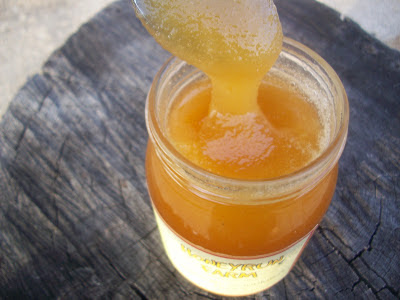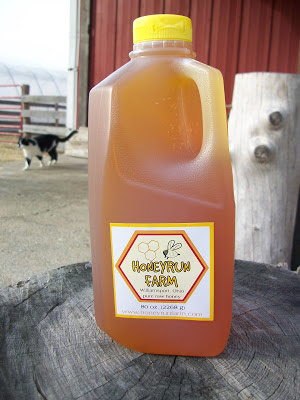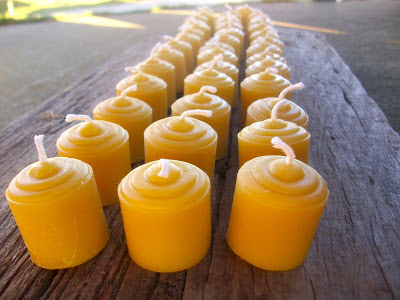Our give-a-way last week has provided a lot of great ideas for blog posts. We've decided to answer a few questions here and there, rather than writing a book in one long blog post. Here are a few more of the "easy" ones that I can answer. I'm going to leave the more technical beekeeping questions for Isaac.
Ianna writes, "I've tried and loved all sorts of liquid honey, but only just recently just tried (aka devoured) some opaque, buttery honey. It wasn't crystallised, it was just buttery smooooth! How is that made? What's the difference (outside the obvious :) between that opaque buttery honey and liquid honey?"
Good question! I believe what you are refering to is "Creamed Honey." There is also a product called "Honey Butter" which is butter mixed with honey, but it sounds more like you had Creamed Honey. This product is very similar to our "Naturally Granulated Honey," but very different in one regard. Creamed honey is made by using a "seed" which is really just another creamed honey that has a specific type of smooth granulation. All honey will granulate, but depending on the type of honey (what nectar it is from), it has different sizes of granules. Here you see some lighter early Summer honey with a pretty fine granulation:
And here you see some late Summer honey that has not quite granulated completely. It is still a bit more runny and smooth. We have sold both as "Naturally Granulated Honey," since we don't do anything to it... just let the honey sit and get more creamy and solid. BUT.. if we were to make creamed honey, we would start with about a pound of the "seed" honey, and add it to about 12 lbs. of liquid honey, and mix it in our Kitchenaid Mixer for about 5 minutes. Then, you put it in your jars and store it at a temp of about 56 degrees for a week or so. Wah-la! Creamed honey! If you wanted to try this yourself, you can google "How to make creamed honey" and come up with similar recipes.
Come to think of it... that would make a wonderful Christmas present! Buy a large jug of honey, a pound of creamed honey, and you can make your friends and family a wonderful "homemade" gift!
And one more question for today.
Jen asks, "Is it easy to make honey sticks?"
 |
| It would be fun to tell you we use a little dropper to get the honey in the stick... but I don't think it would be very believeable! |
We don't actually put the honey into the little stick ourselves. This requires a machine that costs about $18,000 dollars (or so we've heard). We have found a company that allows us to send them our honey, and they put it in the little sticks for us (for a fee, of course). We know other beekeepers who just buy the sticks from the company and re-sell them, but we are really proud to have our own honey in the sticks, so we actually feel it is worth it to send our honey to them so we can have our own Honeyrun Farm honey sticks. So aside from lifting a 60 lb. bucket onto the counter at the post office, the task is really pretty easy. Who am I kidding, I always make our post master Ron lift the bucket for me. Thanks Ron.



















